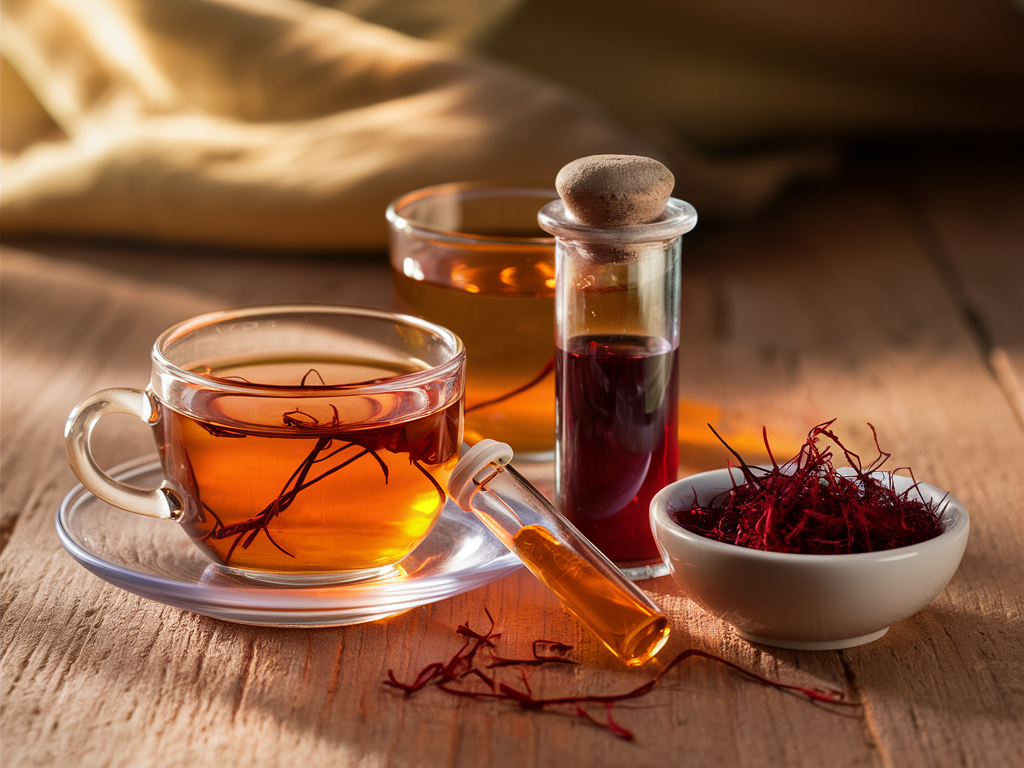The world’s most expensive spice, saffron, has been treasured across civilizations for thousands of years. Harvested from the delicate stigmas of the Crocus sativus flower, this crimson-hued “red gold” requires meticulous hand-picking and processing, explaining its premium price tag. Beyond its culinary applications, saffron has been revered for its remarkable medicinal properties in traditional healing systems from Persian and Ayurvedic to Greek and Chinese medicine.
Modern scientific research is now validating what ancient healers understood: this precious spice contains a powerful combination of bioactive compounds including crocin, crocetin, safranal, and picrocrocin. These compounds contribute to saffron’s distinctive flavor, aroma, and impressive array of health-promoting properties that benefit nearly every system in the human body.
From mood enhancement and cognitive support to heart health and cancer prevention, saffron’s therapeutic potential is extraordinarily diverse. Let’s explore the evidence-based health benefits that make this golden spice truly worth its weight in gold.
Mood Enhancement and Mental Health Benefits
Perhaps the most extensively studied benefit of saffron is its remarkable impact on mental health. Research has consistently demonstrated that saffron extract can effectively alleviate symptoms of mild to moderate depression, rivaling the efficacy of conventional antidepressant medications like fluoxetine (Prozac) and imipramine, but with fewer adverse effects.
Multiple randomized controlled trials published in prestigious journals such as the Journal of Ethnopharmacology and Phytomedicine have confirmed saffron’s antidepressant properties. A meta-analysis of clinical studies concluded that saffron supplementation significantly reduced depression symptoms compared to placebo treatments.
The mood-enhancing effects of saffron can be attributed to its ability to modulate neurotransmitters like serotonin, dopamine, and norepinephrine in the brain. Safranal, one of saffron’s primary compounds, appears to inhibit serotonin reuptake, similar to how SSRIs (selective serotonin reuptake inhibitors) function, allowing more serotonin to remain available in the brain.
Beyond depression, saffron has demonstrated anxiety-reducing properties. Regular consumption may help mitigate excessive worry, tension, and nervousness, offering a natural alternative for those seeking stress relief without pharmaceutical interventions.

Powerful Antioxidant Protection
Saffron ranks among the most potent natural antioxidants discovered, boasting an impressive ORAC (Oxygen Radical Absorbance Capacity) value. This exceptional antioxidant capacity stems from its rich concentration of carotenoid compounds including crocin and crocetin, along with other bioactive substances like safranal.
These compounds neutralize harmful free radicals—unstable molecules that damage cells through oxidative stress. By donating electrons to stabilize these free radicals, saffron’s antioxidants help prevent cellular damage linked to aging, chronic inflammation, and various diseases.
The long-term benefits of consuming antioxidant-rich foods like saffron include reduced risk of oxidative stress-related conditions, including heart disease, neurodegenerative disorders, and certain cancers. Regular incorporation of saffron into your diet contributes to your body’s natural defense system against environmental toxins and metabolic byproducts.
Heart Health Promotion
Cardiovascular disease remains the leading cause of mortality worldwide, making saffron’s heart-protective properties particularly significant. Research indicates that saffron positively influences several key markers of cardiovascular health.
Studies have shown that saffron can help regulate blood lipid profiles by reducing total cholesterol, LDL (“bad”) cholesterol, and triglyceride levels while potentially increasing HDL (“good”) cholesterol. This lipid-balancing effect may help prevent atherosclerosis—the buildup of plaque in arteries that leads to heart attacks and strokes.
Additionally, saffron appears to have modest but meaningful blood pressure-lowering effects. Its active compounds help relax blood vessels, improving circulation and reducing strain on the heart. The spice’s potent anti-inflammatory properties further protect the cardiovascular system by reducing chronic inflammation, a key contributor to heart disease.
Regular consumption of saffron, as part of a heart-healthy diet, may provide cumulative cardiovascular benefits over time, potentially reducing risk factors associated with coronary artery disease and other cardiac conditions.
Potential Cancer-Fighting Properties
Emerging research indicates that saffron possesses promising anti-cancer properties, with studies reporting its ability to selectively target cancer cells while sparing healthy ones—a holy grail in cancer treatment research.
The carotenoids in saffron, particularly crocin and crocetin, have demonstrated anti-tumor effects through multiple mechanisms: inhibiting cancer cell proliferation, inducing apoptosis (programmed cell death) in malignant cells, reducing inflammation, and disrupting the formation of new blood vessels that feed tumors (anti-angiogenesis).
Laboratory and animal studies have shown saffron’s potential efficacy against several cancer types, including colorectal, breast, liver, lung, prostate, and skin cancers. For instance, research published in Anticancer Research found that saffron extract significantly inhibited the growth of colorectal cancer cells.
While human clinical trials are still in early stages, the preliminary evidence suggests that saffron may eventually serve as a complementary approach in cancer prevention and potentially as an adjunct to conventional cancer treatments. Its unique ability to target malignant cells while protecting normal tissue makes it particularly promising in the oncology field.
Vision and Eye Health Improvement
The protective effects of saffron on vision have been documented in both traditional medicine practices and modern clinical research. Particularly notable is saffron’s potential benefit for age-related macular degeneration (AMD), a leading cause of vision loss in older adults.
Multiple clinical studies, including double-blind, placebo-controlled trials, have found that saffron supplementation can improve retinal function and visual acuity in patients with early AMD. Research published in Evidence-Based Complementary and Alternative Medicine demonstrated that participants taking saffron supplements for three months experienced significant improvements in their visual sensitivity and acuity compared to those taking placebos.
The carotenoids in saffron, particularly crocin and crocetin, appear to protect retinal cells from oxidative damage and enhance oxygen diffusion, which improves the functioning of photoreceptors. These compounds also help preserve the structural integrity of retinal cells and may slow the progression of degenerative eye conditions.
Beyond AMD, preliminary research suggests potential benefits for other eye conditions, including diabetic retinopathy and cataracts. Consistent consumption of saffron may help maintain overall ocular health and preserve vision quality as we age.

Memory and Cognitive Enhancement
Saffron’s cognitive-enhancing properties have garnered significant attention from neuroscientists studying age-related cognitive decline and neurodegenerative disorders like Alzheimer’s disease.
Clinical research suggests that saffron extract may help improve memory, learning ability, and overall cognitive function. A 22-week double-blind study published in the Journal of Clinical Pharmacy and Therapeutics found that saffron extract performed comparably to the pharmaceutical drug donepezil in improving cognitive function in patients with mild-to-moderate Alzheimer’s disease, but with fewer digestive side effects.
The neuroprotective benefits of saffron can be attributed to multiple mechanisms. Its antioxidant compounds protect brain cells from oxidative stress and reduce the formation of beta-amyloid plaques—protein clusters that contribute to Alzheimer’s pathology. Additionally, crocin appears to enhance the brain’s levels of brain-derived neurotrophic factor (BDNF), a protein that supports the survival and growth of neurons.
Regular consumption of saffron may offer preventative cognitive benefits for healthy individuals while potentially slowing cognitive decline in those experiencing age-related memory issues. This makes saffron a promising natural compound for maintaining brain health throughout the aging process.
Sexual Health and Libido Boost
Across diverse cultures, saffron has been valued as a natural aphrodisiac for centuries. Modern science now validates its traditional reputation for enhancing sexual function and desire.
Research indicates that saffron can positively impact various aspects of sexual health in both men and women. For men, studies published in the journal Phytomedicine found that saffron supplementation significantly improved erectile function and satisfaction in participants with erectile dysfunction. The improvements were observed after just ten days of treatment and continued throughout the study period.
For women, saffron has shown promise in addressing sexual dysfunction, particularly in those experiencing decreased libido as a side effect of antidepressant medications. A clinical trial published in Human Psychopharmacology demonstrated that saffron supplementation significantly improved sexual function and satisfaction in women taking fluoxetine (Prozac) for depression.
The mechanisms behind saffron’s positive effects on sexual health include increased blood flow to genital tissues, hormonal balance improvement, mood enhancement, and reduction of stress and anxiety—all factors that contribute to healthy sexual function.
Immune System Support
Saffron contains compounds that enhance immune function through multiple pathways, helping the body defend against pathogens and maintain optimal health.
The spice exhibits significant antimicrobial properties, with research demonstrating its effectiveness against various bacteria, fungi, and viruses. Laboratory studies have shown that saffron extracts can inhibit the growth of pathogenic bacteria including Staphylococcus aureus, Escherichia coli, and Salmonella typhi.
Beyond direct antimicrobial action, saffron enhances immune cell function. Research indicates that crocin and crocetin may stimulate the activity of natural killer cells, macrophages, and other immune cells responsible for identifying and eliminating pathogens and abnormal cells.
The anti-inflammatory properties of saffron contribute to immune balance, helping to prevent excessive inflammatory responses while supporting appropriate immune activation when needed. This dual-action makes saffron particularly valuable for maintaining immune system equilibrium.
Regular consumption of saffron may help strengthen the body’s natural defenses against common illnesses while supporting overall immune competence—especially valuable during seasonal changes and periods of increased susceptibility.
Skin Health and Beauty Benefits
Saffron has been incorporated into beauty rituals and skincare preparations for millennia, particularly in Persian, Indian, and Mediterranean cultures. The spice’s benefits for skin health are attributed to its powerful antioxidant, anti-inflammatory, and brightening properties.
Research supports saffron’s effectiveness in combating signs of skin aging. Its antioxidants protect against UV damage and environmental stressors that contribute to premature aging, while its anti-inflammatory compounds reduce redness, irritation, and inflammatory skin conditions like eczema and psoriasis.
Saffron contains natural compounds that inhibit tyrosinase, an enzyme involved in melanin production, potentially helping to fade hyperpigmentation, dark spots, and uneven skin tone. Traditional formulations combining saffron with honey, milk, or other natural ingredients have been used historically to brighten complexion and improve skin radiance.
Modern skincare products increasingly incorporate saffron extract for its multifaceted benefits. Whether consumed internally or applied topically, saffron offers comprehensive skin support, promoting a healthy, youthful complexion from the inside out.
Digestive Health Improvement
Traditional healing systems have long employed saffron to address various digestive complaints, and contemporary research affirms its gastrointestinal benefits.
Saffron exhibits gastroprotective properties, helping to soothe digestive discomfort and protect the stomach lining from irritation and damage. Studies suggest it may help prevent and treat gastric ulcers by strengthening the mucosal barrier and reducing excessive stomach acid secretion.
The spice appears to regulate digestive enzyme activity and stimulate bile production, potentially improving nutrient absorption and the digestive process. Some research indicates that saffron may also support a healthy balance of gut microbiota, the beneficial bacteria essential for optimal digestive and immune function.
Additionally, saffron may help regulate appetite through its effect on neurotransmitters involved in hunger signaling. This appetite-modulating effect, combined with improved digestion, makes saffron a valuable spice for overall gastrointestinal health and comfortable digestion.
Pain Management Capabilities
Saffron possesses natural analgesic (pain-relieving) properties that make it valuable for managing various types of discomfort. Traditional practitioners have used saffron preparations for centuries to alleviate pain, and modern research is beginning to validate these applications.
Studies suggest that saffron’s pain-relieving effects stem from its ability to modulate inflammatory pathways and influence neurotransmitters involved in pain perception. Research published in the Journal of Ethnopharmacology demonstrated that saffron extract produced significant analgesic effects in experimental models of acute and chronic pain.
Specific conditions where saffron may offer pain relief include inflammatory conditions like arthritis, menstrual cramps, headaches, and certain types of neuropathic pain. The advantage of saffron over conventional pain medications lies in its minimal side effects and lack of addiction potential when used appropriately.
While saffron may not replace prescription pain medications for severe conditions, it offers a gentle yet effective complement to pain management strategies, particularly for chronic mild to moderate pain where long-term use of pharmaceutical analgesics raises concerns about side effects.

Anti-Diabetic Potential
Emerging research suggests that saffron may offer significant benefits for blood sugar management and diabetic complications, making it a spice of interest for those concerned with metabolic health.
Studies have shown that saffron extracts can help regulate blood glucose levels by multiple mechanisms. Animal research published in the Journal of Agricultural and Food Chemistry found that crocin, a major active compound in saffron, improved insulin sensitivity and glucose uptake in muscle cells, helping to lower blood sugar levels.
Beyond blood sugar regulation, saffron appears to protect against diabetic complications through its antioxidant and anti-inflammatory properties. Research indicates potential benefits for diabetic nephropathy (kidney damage), retinopathy (eye damage), and peripheral neuropathy (nerve damage)—common complications that significantly impact quality of life for people with diabetes.
Saffron may also help prevent the development of type 2 diabetes by improving insulin function, reducing inflammation, and protecting pancreatic beta cells responsible for insulin production. These preventative effects make saffron valuable not only for those with diagnosed diabetes but also for individuals at risk due to family history or lifestyle factors.
Menstrual Symptom Relief
Women seeking natural alternatives for managing menstrual discomfort may find saffron particularly beneficial. Traditional medical systems, especially Persian medicine, have long used saffron to address women’s reproductive health issues.
Research supports saffron’s effectiveness in alleviating premenstrual syndrome (PMS) symptoms. A double-blind, placebo-controlled study published in BJOG: An International Journal of Obstetrics & Gynaecology found that women taking saffron supplements experienced significant reductions in PMS symptoms compared to those taking placebo. The improvements included reduced mood swings, irritability, depression, and physical symptoms like breast tenderness and food cravings.
Saffron also appears effective for managing menstrual pain (dysmenorrhea). Its antispasmodic properties help relax uterine muscles, reducing cramping, while its anti-inflammatory effects decrease overall discomfort. A clinical study comparing saffron to mefenamic acid (a common NSAID used for menstrual pain) found comparable efficacy in pain reduction.
The mood-stabilizing effects of saffron are particularly valuable during hormonal fluctuations, helping to mitigate the emotional symptoms that often accompany the menstrual cycle. This comprehensive approach to both physical and emotional aspects of menstruation makes saffron a holistic option for women seeking menstrual support.
Sleep Quality Enhancement
Quality sleep is fundamental to overall health, and saffron appears to offer natural support for those struggling with sleep disturbances. Traditional applications of saffron for sleep promotion are now being validated by scientific investigation.
Research indicates that saffron may improve sleep quality through multiple mechanisms. Its active compound safranal demonstrates anxiolytic (anxiety-reducing) and sedative effects without next-day grogginess often associated with sleep medications. By calming the nervous system and promoting relaxation, saffron helps facilitate the transition to sleep.
A clinical study published in the Journal of Clinical Sleep Medicine found that participants taking saffron extract experienced improvements in sleep quality, time to fall asleep, and total sleep duration compared to those taking placebo. Importantly, these improvements came without the side effects or dependency risks associated with conventional sleep medications.
For those with insomnia related to depression or anxiety, saffron’s mood-regulating properties may address the underlying causes of sleep disturbance, offering a comprehensive approach to sleep improvement that extends beyond simple sedation.
Weight Management Support
Maintaining a healthy weight is increasingly challenging in our modern environment, making natural supports like saffron particularly valuable. Research suggests that saffron may assist weight management efforts through several complementary mechanisms.
Studies indicate that saffron may help reduce appetite and food cravings, particularly for carbohydrate-rich and sweet foods. A clinical trial published in Nutrition Research found that mildly overweight women taking saffron extract snacked less frequently and reported greater feelings of fullness than those taking placebo. The participants experienced significant reductions in snacking frequency and weight over the eight-week study period.
Beyond appetite control, saffron may support metabolism through its effects on metabolic enzymes and fat storage regulation. Some research suggests it may help prevent fat absorption and inhibit fat cell formation, potentially reducing the accumulation of visceral fat associated with metabolic syndrome.
Perhaps most importantly, saffron’s mood-enhancing properties may help address emotional eating—a significant barrier to long-term weight management for many individuals. By reducing stress, anxiety, and depression, saffron may help break the cycle of using food as emotional comfort.
Incorporating Saffron Into Your Diet
To experience the remarkable health benefits of saffron, consider these practical guidelines for incorporating this precious spice into your daily routine:
- Dosage: The typical therapeutic dosage ranges from 30-100 mg of saffron per day, with most studies using standardized extracts of approximately 30 mg daily.
- Culinary uses: Add saffron to rice dishes, soups, stews, seafood preparations, and desserts. For optimal flavor release, crush the threads and soak in warm water or broth for 10-15 minutes before adding to your recipe.
- Saffron tea: Steep 3-5 saffron threads in hot water for 5-10 minutes. Add honey or lemon if desired. This simple tea can be enjoyed 1-2 times daily.
- Saffron milk: Add a few threads of saffron to warm milk with a touch of honey for a soothing bedtime beverage that supports sleep quality.
- Supplements: Standardized saffron extracts are available in capsule form, offering a convenient option when consistent dosing is desired.
Precautions: While saffron is generally safe when consumed in culinary amounts or as recommended supplements, excessive doses (more than 5 grams per day) can be toxic. Pregnant women should use saffron only in small culinary amounts, as high doses may stimulate uterine contractions. Individuals taking blood thinners, antidepressants, or blood pressure medications should consult healthcare providers before supplementing with saffron due to potential interactions.
With its remarkable versatility and evidence-backed health benefits, saffron truly deserves its reputation as a golden treasure. Beyond adding vibrant color and distinct flavor to culinary creations, this precious spice offers a natural approach to enhancing physical and mental wellbeing. By incorporating small amounts of high-quality saffron into your diet regularly, you can harness the powerful health-promoting properties of this ancient medicinal spice.

